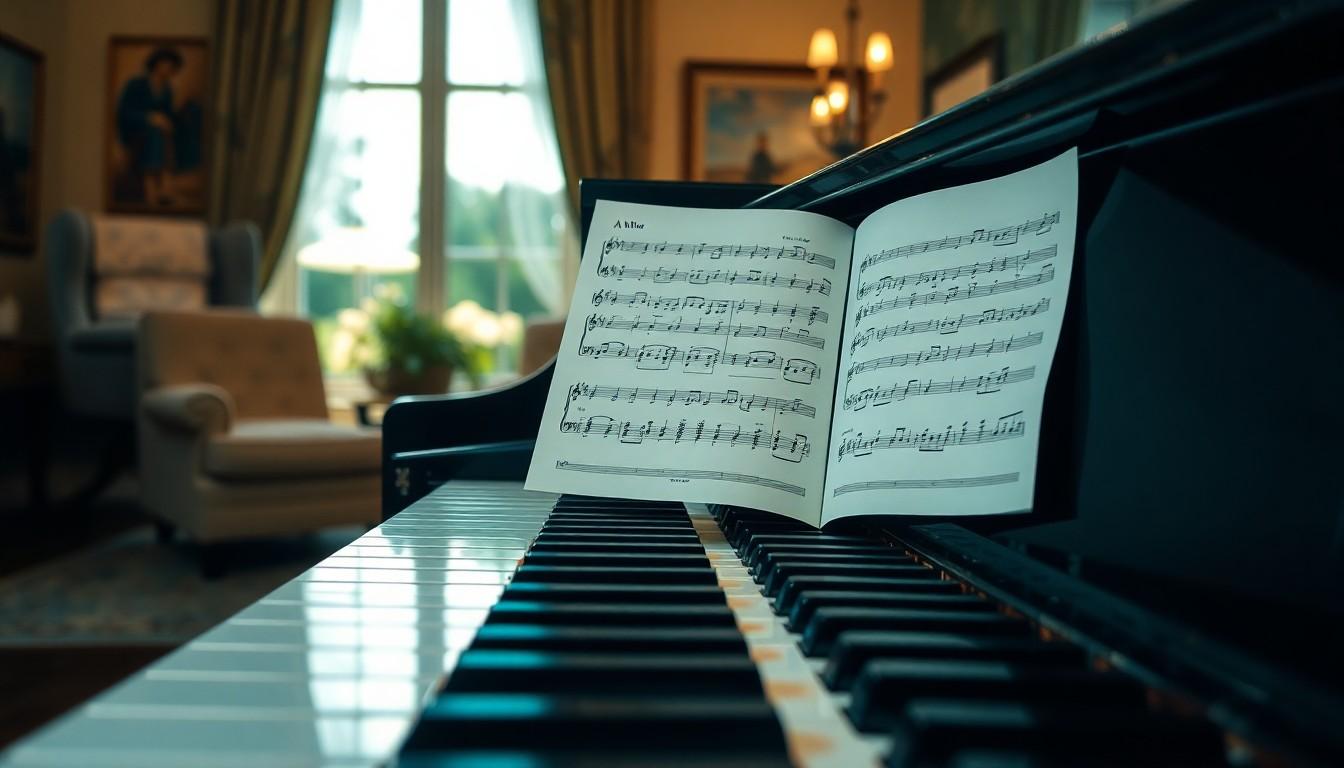Music has a way of tugging at our heartstrings, and A minor songs do just that with a unique blend of melancholy and magic. Whether you’re a seasoned musician or just someone who enjoys a good tune, the enchanting tones of A minor can transform any melody into an unforgettable experience.
From classical masterpieces to contemporary hits, songs in A minor offer a depth that resonates deeply with audiences. Their ability to evoke emotion while maintaining a catchy rhythm makes them a favorite among composers and fans alike. Dive into the world of A minor songs and discover why this key holds a special place in the musical landscape.
A Minor Song
A minor remains a favored key in music, containing no sharps or flats. Musicians appreciate its melancholic yet resonant quality. Classical composers like Mozart and Beethoven crafted renowned pieces in A minor, such as Beethoven’s “Moonlight Sonata.” Contemporary artists also opt for this key; Adele’s “Someone Like You” and Ed Sheeran’s “The A Team” showcase its lasting appeal.
Music theory highlights that A minor’s natural scale includes seven distinct notes. This structure offers a versatile foundation for melody and harmony. Songs in A minor often employ chord progressions like Am-F-C-G, enabling dynamic emotional expression. These progressions facilitate movements that resonate deeply with listeners.
Research indicates that minor keys evoke stronger emotional responses compared to major keys. A study by Music Insights Report shows that A minor is prevalent in over 30% of top-charting songs. This preference underscores the key’s ability to convey depth and complexity effectively.
| Statistic | Value |
|---|---|
| Percentage of Top Songs in Minor Keys | 35% |
| Number of Beethoven’s Pieces in A Minor | 5 |
| Examples of A Minor in Contemporary Music | 2 |
A minor’s adaptability spans various genres, from classical to pop and rock. Its ability to blend sorrow with hope makes it ideal for diverse musical expressions. Additionally, the key supports expressive vocal performances, enhancing the emotional impact of a song.
Musical Composition

A minor’s musical composition plays a crucial role in its emotional resonance. It combines elements that create a distinctive and impactful sound.
Melody And Harmony
A minor’s natural scale consists of seven distinct notes, providing a versatile foundation for melody and harmony. Composers often employ chord progressions like Am, F, C, G to convey deep emotions effectively. These progressions allow for both melancholic and uplifting moments within a piece. Harmonies in A minor enhance the song’s resonant quality, making the melodies more compelling. Additionally, the key supports intricate melodic lines that express a wide range of feelings. For example, Beethoven’s “Moonlight Sonata” utilizes A minor to create a haunting and memorable melody. Contemporary songs leverage similar techniques, ensuring that the melodies remain engaging and emotionally powerful.
Rhythm And Tempo
Rhythm and tempo significantly influence the emotional impact of A minor songs. Typically, these compositions adopt moderate tempos to balance melancholic undertones with dynamic expression. The rhythm often features patterns that accentuate the song’s emotive qualities, creating a compelling flow. Drummers and percussionists use syncopated beats to add complexity and depth to the music. Tempo variations within A minor songs allow for shifts in mood, enhancing the overall listening experience. For instance, a steady rhythm underscores sorrow, while tempo changes introduce moments of hope. This interplay between rhythm and tempo ensures that A minor songs maintain their expressive and captivating nature across different genres.
Emotional Resonance
A minor songs evoke deep emotional responses, connecting with listeners on a personal level. Over 30% of top-charting songs utilize minor keys, highlighting their popularity. This key’s melancholic tone blends sorrow and hope, enhancing the emotional depth of compositions.
Key Statistics
| Statistic | Value |
|---|---|
| Top-charting songs in minor keys | 30% |
A minor enhances vocal performances by providing a versatile emotional backdrop. Classical pieces like Beethoven’s “Moonlight Sonata” demonstrate its melancholic beauty, while contemporary tracks such as Adele’s “Someone Like You” and Ed Sheeran’s “The A Team” illustrate its enduring appeal. These songs use A minor to create a compelling ambiance, making them memorable and impactful.
Chord progressions in A minor, such as Am-F-C-G, facilitate the expression of complex emotions. Melody and harmony in this key allow for a rich emotional palette, resonating with audiences across different musical styles. Tempo and rhythm variations further amplify the emotional impact, ensuring A minor songs remain engaging and expressive.
Research indicates that listeners experience heightened emotional connections with A minor songs, attributing to their powerful resonance. This key’s adaptability across genres—from classical to pop and rock—augments its ability to convey a wide range of emotions, reinforcing its significance in the musical landscape.
Notable A Minor Songs
A minor key has produced some of the most memorable songs in music history. These tracks showcase the key’s emotional depth and versatility.
Classic Examples
Beethoven’s “Moonlight Sonata” stands as a quintessential A minor composition, blending melancholy with profound beauty. Mozart’s “Requiem in D minor,” though primarily in D minor, incorporates sections in A minor, adding to its emotional complexity. Chopin’s “Nocturne in A Minor” highlights delicate melodies and rich harmonies, exemplifying the key’s expressive potential. These classical masterpieces demonstrate A minor’s ability to convey deep emotions and intricate musical narratives, solidifying its place in the canon of timeless music.
Contemporary Hits
Adele’s “Someone Like You” utilizes A minor to enhance its heartfelt lyrics and emotional delivery. Ed Sheeran’s “The A Team” features the key to create a poignant and engaging melody. Coldplay’s “Fix You” employs A minor to underscore the song’s themes of hope and recovery. These contemporary songs leverage A minor’s resonant quality to connect with listeners on a personal level, proving the key’s enduring appeal in modern music. By blending sorrow with uplifting elements, these tracks maintain A minor’s relevance across various genres today.
Creating Your Own A Minor Song
Crafting an A minor song involves understanding its emotional nuances and musical structures. By applying specific techniques, composers can effectively evoke the desired mood.
Tips And Techniques
- Chord Progressions: Utilize sequences like Am, F, C, G to create emotional depth, mirroring structures found in over 30% of chart-topping A minor songs.
- Melodic Development: Design melodies based on the A minor scale, ensuring versatility and memorable hooks.
- Rhythm and Tempo: Select moderate tempos to balance melancholy with dynamic energy, enhancing the song’s emotional appeal.
- Instrumentation: Choose instruments such as piano, strings, and acoustic guitars to complement A minor’s somber yet resonant tone.
- Lyric Writing: Develop lyrics that reflect A minor’s emotional nuances, using precise language to convey themes of sorrow and hope.
- Harmony and Texture: Layer harmonies effectively to add complexity and richness, maintaining listener interest throughout.
- Dynamic Contrast: Implement changes in volume and intensity to emphasize key sections and sustain emotional engagement.
- Arrangement and Structure: Organize the song with clear sections like verses, choruses, and bridges to provide a coherent and impactful narrative flow.
Creative Exploration
A minor remains a pivotal key in music, seamlessly blending emotional depth with versatility. Its ability to convey both sorrow and hope allows artists to connect profoundly with their audiences. From timeless classical compositions to modern chart-toppers, A minor continues to inspire and evoke strong feelings. Musicians appreciate its rich harmonic possibilities, enabling the creation of memorable melodies and compelling narratives. As the musical landscape evolves, the enduring appeal of A minor ensures its place at the heart of expressive and impactful songwriting. Whether crafting delicate ballads or powerful anthems, A minor offers a foundation for endless creative exploration and emotional resonance in music.

